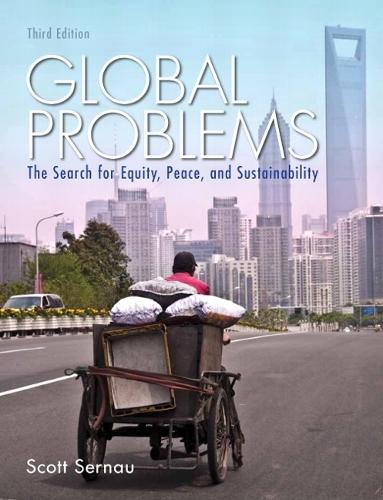Overview
Exploring social problems on a global scale This text uses social science perspectives to examine the various dimensions of globalisation, the social problems of inequality, war and violence, and environmental sustainability that are occurring on a global scale. Clear writing and vivid examples help students to better understand their role as global citizens. The book was designed for courses such as Global Issues, Contemporary Problems, Social Problems, Social Stratification, World Cultures, and Social Change.
Full Product Details
Author: Scott Sernau
Publisher: Pearson Education (US)
Imprint: Pearson
Edition: 3rd edition
Dimensions:
Width: 17.80cm
, Height: 1.70cm
, Length: 23.20cm
Weight: 0.540kg
ISBN: 9780205841776
ISBN 10: 0205841775
Pages: 408
Publication Date: 14 March 2012
Audience:
College/higher education
,
Postgraduate, Research & Scholarly
Replaced By: 9780205935345
Format: Paperback
Publisher's Status: Active
Availability: Awaiting stock

The supplier is currently out of stock of this item. It will be ordered for you and placed on backorder. Once it does come back in stock, we will ship it out for you.
Reviews
Thank you to the following reviewers: Christopher Whitsel North Dakota State University Gerald Titchener Des Moines Area Community College Stephen Sills University of North Carolina Greensboro
Thank you to the following reviewers: Christopher Whitsel North Dakota State University Gerald Titchener Des Moines Area Community College Stephen Sills University of North Carolina Greensboro
Thank you to the following reviewers: Christopher Whitsel North Dakota State University Gerald Titchener Des Moines Area Community College Stephen Sills University of North Carolina Greensboro
Author Information
Scott Sernau (Ph.D., Cornell University) is Professor of Sociology and Director of International Programs at Indiana University South Bend where he regularly teaches courses on social inequality, urban society, sustainability and global issues. He has taught in Mexico, in France and aboard ship on global voyages with the University of Virginia’s Semester at Sea program. He is the author of Economies of Exclusion: Underclass Poverty and Labor Market Change in Mexico; Critical Choices: Applying Sociological Insight in Your Life, Family, and Community; Bound: Living in the Globalized World, and Social Inequalities in a Global Age as well as editor of Contemporary Readings in Globalization. He has won six trustee’s teaching awards, as well as the Sylvia Bowman Award for Distinguished Teaching and the PA Mack Award for Distinguished Service to Teaching. He serves on the steering committee of the IU Faculty Colloquium on Excellence in Teaching, the board of the IUSB Center for a Sustainable Future, and the board of the Toda Institute for Global Peace and Policy Research.




